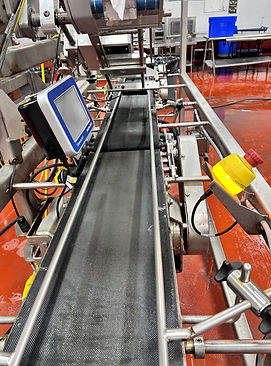
Sanitization Services
Professional Food Plant Cleaning Services
Food plant cleaning is vital for ensuring food safety, compliance with health regulations, and maintaining high standards of sanitization in food production facilities. We provide specialized cleaning services to eliminate contaminants, prevent cross-contamination, and maintain hygiene in processing, packaging, and storage areas.
Free No-Obligation Estimate!

Why Food Plant Cleaning is Essential
Cleanliness and sanitization in food production are crucial to prevent the spread of harmful bacteria, viruses, and contaminants that can compromise food safety. Proper sanitation ensures compliance with regulatory standards and protects public health by reducing the risk of foodborne illnesses. Maintaining a clean environment also helps improve the quality and shelf life of products, fostering consumer trust and brand integrity.
Tailored Cleaning Plans for Your Facility
Why Choose Us?
1. Prevent Contamination
-
Microbial Control: Food processing environments are prone to the growth of bacteria, mold, and yeast, which can lead to food borne illnesses if not controlled. Regular deep cleaning helps eliminate pathogens like listeria monocytogenes, salmonella, and ecoli.
-
Cross-Contamination: Residues from allergens or different food products can contaminate subsequent batches, posing health risks. Thorough cleaning prevents this cross-contact.
2. Regulatory Compliance
-
Food Safety Standards: Agencies like the FDA, USDA, and local health departments set strict hygiene standards. Regular cleaning ensures compliance with regulations such as the Food Safety Modernization Act (FSMA) and Hazard Analysis Critical Control Point (HACCP) guidelines.
-
Audit Preparedness: Regular deep cleaning keeps facilities audit-ready, reducing the risk of violations that could lead to fines, shutdowns, or recalls.
3. Maintain Equipment Efficiency
-
Reducing Downtime: Accumulated debris, grease, and residue can cause equipment malfunctions or breakdowns. Routine cleaning extends equipment lifespan and ensures optimal performance.
-
Energy Efficiency: Clean equipment often operates more efficiently, reducing energy consumption and maintenance costs.
4. Product Quality Assurance
-
Consistency: Clean environments help maintain product quality, taste, and appearance by preventing contamination that could alter these factors.
-
Shelf Life: Reducing microbial load helps extend the shelf life of products, minimizing spoilage and waste.
5. Pest Control
-
Deterrence: Food residues attract pests such as rodents, insects, and birds. Regular deep cleaning disrupts pest habitats and food sources, reducing infestation risks.
-
Integrated Pest Management (IPM): A clean facility complements pest control measures, making them more effective.
6. Workplace Safety
-
Reducing Hazards: Grease, spills, and clutter can create slip, trip, and fall hazards. Regular cleaning improves workplace safety for employees.
-
Improved Air Quality: Removing dust, mold, and chemical residues enhances air quality, reducing respiratory issues and other health risks for workers.
7. Reputation Management
-
Consumer Trust: Consistently clean facilities reduce the likelihood of recalls and food borne illness outbreaks, maintaining brand integrity and consumer confidence.
-
B2B Relationships: Businesses supplying food products to retailers or distributors must mean stringent hygiene standards to retain contracts and partnerships.
In summary, semi-annual or quarterly deep cleaning is not just a regulatory requirement but a best practice that supports food safety, operational efficiency, and brand reputation.
It is less costly to engage semi annual or quarterly food manufacturing cleaning services and disinfection as opposed to a detected outbreak, recall and or regulatory mandatory stoppage at your facility. ITS Environmental Services tailors it's C&D program around your facility. ITS Environmental Services tailors it's C&D program around your facility's specific needs, to make sure your facility is at it's highest level of cleanliness with minimal interruptions to your processing time.

Doug Baruchin, Owner

ITS Environmental Services
Certifications



Having an HACCP certification means that through our work your food production can meet global safety standards by controlling hazards, ensuring product safety, compliance, and consumer trust.
Having an IICRC (Institute of Inspection, Cleaning and Restoration Certification) means that we meet industry-recognized standards in cleaning, inspection, and restoration services. It signifies our expertise professionalism, and adherence to best practices, ensuring the highest quality service possible.
A CEICR certification represents our expertise in infection control remediation for environments like hospitals and schools. It demonstrates verified field experience and knowledge in managing infection risks during construction and remediation projects.
ITS Environmental Services
Request Your
No-Obligation Estimate
Prevent contamination, maintain food safety compliance, and ensure equipment efficiency. Reduce the risk of pathogens, cross-contamination, and product spoilage, while supporting workplace safety and pest control. ITS Environmental Services tailors its cleaning programs to meet your facility's specific needs, ensuring cleanliness with minimal disruption to production.
Proven Track Record of Success
Hire them no questions asked!
“Responsive, kind, and knowledgeable, and a team was there within 48 hours. They went above and beyond. I'm so relieved!”
Heather A.
They made me feel 100% comfortable
“They allayed my fears and made me feel good about the decision. Thank you for making a difficult situation smooth and easy to resolve!”
Lynn B.
Best Investment Ever!
“They set up a crew to come within a couple hours. What I imagined would never be perfectly clean again was spotless! Acute attention to detail and incredibly kind crew.”
Emily R.
